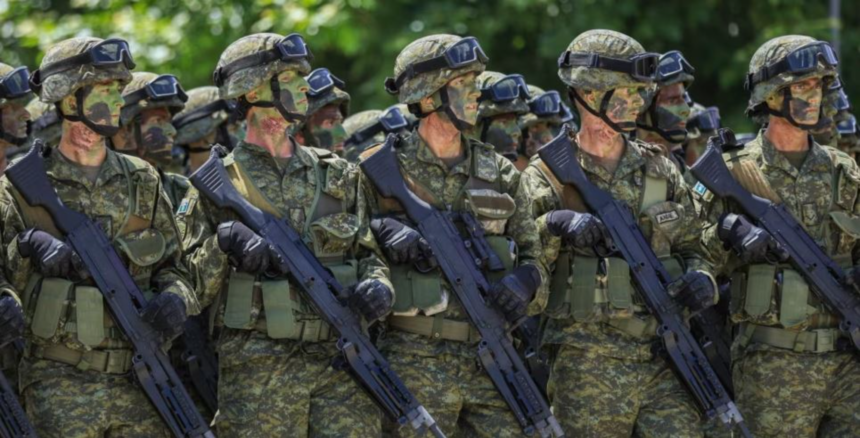Kosovo and two countries in the Western Balkans that are members of the North Atlantic Treaty Organization (NATO), Albania and Croatia, signed a declaration this week to deepen cooperation in the field of defense and security.
Without providing specific details, the defense ministers of the three countries said that they would increase the interoperability of their armies through education, training, and joint exercises, as well as engage in combating hybrid threats. Additionally, they will coordinate policies for Euro-Atlantic integration.
Serbia viewed this as a step that “undermines regional stability” and a threat to its “territorial integrity,” while Kosovo stated that the initiative should not be seen as a threat to anyone but as a message that the three countries will stand united in the face of any challenge or threat.
Security experts in Prishtina and Belgrade do not see the declaration as a step toward forming a formal defense alliance, such as that of NATO.
What Unites the Three Countries?
For Ramadan Ilazi, head of research at the Kosovo Center for Security Studies (QKSS), the significance of the declaration lies in the fact that it came at a time when the unpredictability of existing security alliances around the world has increased.
He views the initiative as a step toward strengthening alternative or strategic alliances, allowing Kosovo to advance in defense matters since it still does not have a clear path to NATO membership.
“I’m not optimistic that this alliance marks the beginning of the creation of a formal defense bloc, but rather more like a new group of states in Europe that share the same concerns or interpretation of the security situation in Southeastern Europe,” said Ilazi to Radio Free Europe.
Ilazi believes that NATO’s peacekeeping mission in Kosovo, KFOR, and the alliance itself will be the umbrella for these cooperations, as he does not believe Albania and Croatia would act against NATO’s interests in the region.
A NATO official told Radio Free Europe that Albania and Croatia are long-standing contributors to regional stability, also through the KFOR framework. When asked about the new initiative, the official said that “the alliance is aware” but that it is up to the signing parties to say more.
Despite not having the form of an international agreement, the initiative, with political will from the parties, could lead to “soft political actions,” according to security expert Vuk Vuksanovic from the Belgrade Center for Security Policy.
He told Radio Free Europe that Balkan cooperation has been partially encouraged by warnings about a possible reduction of “U.S. engagement in NATO, if Europeans do not invest more in their own defense.”
According to Vuksanovic, in an environment where NATO does not leave but “weakens,” it is possible that certain states will form informal groups to collaborate.
Kosovo, Albania, and Croatia have warned that the initiative could expand with new members, although no country names have been mentioned. However, Serbia hinted that one of these countries could be Bulgaria. The Bulgarian government did not respond to Radio Free Europe’s request for comment.
Even if other countries join, Ilazi does not think this group is moving toward creating a military alliance that embodies NATO principles like collective defense.
Why is Serbia Opposing the Initiative?
Belgrade has asked Tirana and Zagreb for clarification about the goals of the initiative, stating that “it will not allow unilateral actions that could jeopardize our territorial integrity, the safety of our citizens, and peace in the region.”
Kosovo’s Ministry of Foreign Affairs responded, saying that Serbia’s behavior constitutes a new violation of the Brussels Agreement, “which clearly states that Serbia should not hinder Kosovo’s international relations.”
Meanwhile, Croatia said that the time when Zagreb asked Belgrade for permission on how to act and with whom to cooperate is long past.
For Vuksanovic, Serbia most likely sees this initiative as a “political provocation from Zagreb.”
According to him, the Belgrade government could use this development to shift attention away from the political situation in Serbia and the protests that have been ongoing there for several months.
Ilazi also believes that Serbia’s harsh reaction is simply because of Croatia’s involvement, which fought for independence from the former Yugoslavia in the ’90s.
However, he considers that the three-way cooperation has been motivated by a shared view that Russia exerts malicious influence in the region, and that autocratic regimes in the region pose a threat to Balkan stability—accusations that have often been made by Kosovo authorities.
While Ilazi believes that Kosovo would benefit greatly from the experiences of the two NATO countries, as well as from various training programs, he expresses skepticism about the implementation of the initiative, citing the low level of implementation of previous agreements between Prishtina and Tirana.







